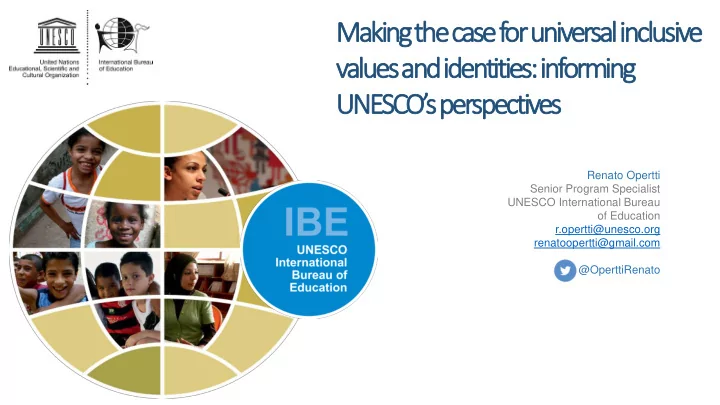

Making the case for universal inclusive values and identities: informing UNESCO’s perspectives Renato Opertti Senior Program Specialist UNESCO International Bureau of Education r.opertti@unesco.org renatoopertti@gmail.com @OperttiRenato
Four Dis iscussion points 1. From discourse/rhetoric to compliance/action on universal values : Their recognition and acceptance as aspirations/ideals, as binding normative and ethical references as well as contemplating creedal, cultures and identities; Values are culturally oriented and related, but not narrowed to cultures; Not every adjustment or deviation can be justified by cultural/contextual considerations.
Four Dis iscussion points 2. From silos identities to commonalities across identities : Worldwide the discourse and practices around group identities are dominating the cultural, political, economic and social agenda; This is changing dramatically the understanding of politics and public policies as well as the commitments, relationships and trust between politics, citizens and civil society at the international and national levels; There is the need to reposition individual rights and responsibilities as inherent to the person beyond any group identities or/and consideration .
Four Dis iscussion points 3. From multiculturalism as dogmas and close identities to acceptable common grounds for respect, sustainability and living together : It is not about: • the rejection of multiculturalism or the “return” to a pre - multicultural world; • the exacerbation of multiculturalism as extremes from different sides can pave the way to more societal fragmentation, unrest and violence; or • solely the cultural and political recognition of each identity, which is a must but it is not sufficient; But it is about the relevance of understanding, broadening, negotiating and reinforcing commonalities.
Four Dis iscussion points 4. The role of education as reinforcing the links between common references, and diversity of identities : Diversity is not a problem or a hindrance, but crucially a window of opportunities to enhance learning opportunities, processes and outcomes, and to support the integral development of the learner; Diversity encompasses individual, social, cultural, ethnic and territorial components, among others; Diversity requires universal societal and policy backup to be recognized; Diversity without universalism can degenerate into segmentation, polarization and conflict.
The way forw rward • There is a need to (re)identify and validate globally shared norms , values and understandings through reference to empirical evidence, cultural analysis and inclusive democratic dialogue in light of a dynamic, changing and globalizing world. • Need of establishing authentic dialogue within a spirit of cooperation and tolerance among all ladders and levels of the education system, and with a focus on the school .
UNESCO’s role • It is key to: Promote international understanding , co-operation, peace, and respect for human rights and fundamental freedoms; Promote a culture of “learning to live together”; Affirm that learning to live together begins with a "qualified universalism of human values" , a stance that acknowledges the shared human values with the contextual particularity of some values. Crucially this through Democratic deliberations at the international level with regard to universal values, human rights and education; and Guidance for such deliberation to take place in an inclusive manner at the national, district and school levels.
Recommend
More recommend